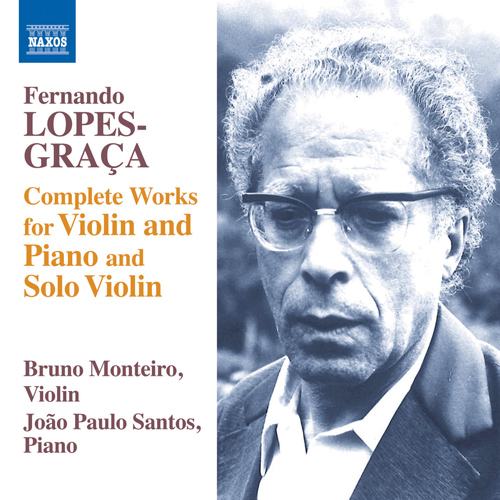LOPES-GRAÇA, F.: Violin and Piano Works / Solo Violin Works (Complete) (B. Monteiro, J.P. Santos)
Fernando Lopes-Graça stood out in his opposition to the authoritarian Estada Novo regime in mid-20th-century Portugal, his studies with Koechlin in Paris crucial to his attitude towards traditional against politically propagandized folk music. The Sonatinas are youthful works that appeal to concision and simplified writing, while popular roots and dance character are evident in the Prelúdio, Capricho e Galope. Passion, virtuosity and distinctive lyrical expression resonate through all these works, right up to the profound lamentation and emotional battles of the Adágio Doloroso e Fantasia. Lopes-Graça’s piano concertos can be found on Naxos 8.572817, and his Symphony (8.572892) was a MusicWeb International ‘Recording of the Year’ in 2012.

Bruno Monteiro is among the leading violinists in Portugal. He studied in New York with Patinka Kopec, Isidore Cohen and members of the American String Quartet at the Manhattan School of Music with scholarships from the Gulbenkian Foundation and Centro Nacional de Cultura, later completing his training in Chicago under Shmuel Ashkenasi as a scholar of the Ministério da Cultura and Fundação para a Ciência e Tecnologia. He performs as recitalist, concert soloist and chamber musician in all the major musical centres of Portugal and internationally, appearing throughout Europe, the Philippines, Malaysia, South Korea and the United States (Carnegie Hall). Monteiro has been a guest soloist with leading orchestras, including the English Chamber Orchestra and the Portuguese Symphony Orchestra. In recital he has performed with João Paulo Santos since 2002. His discography includes the albums Début, 20th Century Expressions, In Recital, Solo, the complete works for violin and piano by Robert and Clara Schumann, violin sonatas by the esteemed Portuguese composers Óscar da Silva and Armando José Fernandes, the Concerto and the Poème by Chausson and the Violin Sonatas by Saint-Saëns and Richard Strauss.

João Paulo Santos was born in Lisbon and studied piano at the city’s Conservatório Nacional with Adriano Jordão. He also worked with Helena Costa, Constança Capdeville, Lola Aragón and Elisabeth Grümmer. Thanks to a Gulbenkian Foundation bursary, he was able to continue his studies in Paris, with Aldo Ciccolini (1979–84). In 1984 he was appointed assistant chorus director at Lisbon’s Teatro Nacional de São Carlos, becoming chorus director six years later. Having begun his conducting career with Walton’s The Bear, he later conducted the world première of Pinho Vargas’s Édipo, tragédia de saber at Lisbon’s Culturgest. At that same venue he performed the complete Hindemith Piano Sonatas and conducted Menotti’s Help, Help, the Globolinks!. At the Teatro de São Carlos he gave the Portuguese première of Stravinsky’s Renard and world première of Pinho Vargas’s Os Dias Levantados, and he has also conducted productions of Henze’s The English Cat (which earned him the ACARTE prize), Stravinsky’s Les Noces, Offenbach’s Orphée aux enfers, Cimarosa’s Il matrimonio segreto and Britten’s Albert Herring.

Fernando Lopes Graça, or Lopes-Graça as he himself used to write, to preserve his two family names, was born in Tomar, a small city northeast of Lisbon, in 1906 and died in Parede, a small town west of Lisbon on the Atlantic Coast, in 1994. He was one of the most prolific Portuguese composers of the twentieth century, with compositions encompassing a wide range of genres. The most relevant aspect of his musical style is, however, his endeavour to use Portuguese folk-music as a medium to forge his personal style, very much like Béla Bartók, although some of his works are very cosmopolitan in style and approach. As a pianist Lopes-Graça regularly accompanied singers in performances of his own works for voice and piano, and as a conductor he dedicated a great deal of his time to conducting the chorus from the Academia de Amadores de Música in Lisbon, for which he arranged a great deal of Portuguese folk-songs. All his works are characterized by a high degree of technical perfection.
The personal life of Lopes-Graça was not an easy one. He never married, and very early in his life was drawn to Communism. Although he was not active as a politician during the dictatorial regime that was ended by the Portuguese Revolution in 1974, he was prohibited from teaching at the National Conservatory in Lisbon, and imprisoned more than once. Yet he maintained a low profile and he was held in high esteem by fellow musicians of every political persuasion for his artistic and personal integrity.































